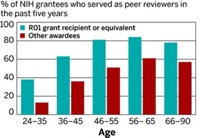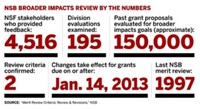Advertisement
Grab your lab coat. Let's get started
Welcome!
Welcome!
Create an account below to get 6 C&EN articles per month, receive newsletters and more - all free.
It seems this is your first time logging in online. Please enter the following information to continue.
As an ACS member you automatically get access to this site. All we need is few more details to create your reading experience.
Not you? Sign in with a different account.
Not you? Sign in with a different account.
ERROR 1
ERROR 1
ERROR 2
ERROR 2
ERROR 2
ERROR 2
ERROR 2
Password and Confirm password must match.
If you have an ACS member number, please enter it here so we can link this account to your membership. (optional)
ERROR 2
ACS values your privacy. By submitting your information, you are gaining access to C&EN and subscribing to our weekly newsletter. We use the information you provide to make your reading experience better, and we will never sell your data to third party members.
Research Funding
NIH revamps grant review process to reduce bias
Scientific merit to get more weight than reputation of investigator or institution
by Britt E. Erickson
October 26, 2023
| A version of this story appeared in
Volume 101, Issue 36
As part of a decade-long effort to level the playing field for investigators seeking money to pursue biomedical research, the US National Institutes of Health is simplifying its grant review process. Expertise and resources—two factors that can lead to potential reputation bias—will be evaluated for sufficiency but will no longer get a numerical score, the agency announced Oct. 19.
The new framework, which goes into effect for grant applications received on or after Jan. 25, 2025, is designed to give more weight to the importance, rigor, and feasibility of a proposed research project. Such factors will continue to be scored numerically.
“Studies have shown that consideration of reputation of the institution or investigator in the grant review process could affect assessment of scientific merit, potentially giving reputation greater weight than other factors,” Lawrence Tabak, acting director of the NIH, says in a statement. “Ultimately, the potential impact of ideas on advancing science should outweigh the reputation of who is applying and where they work.”
The NIH has been struggling for years to make its grant review process fair and to ensure that peer review panels choose the best research proposals. The new framework also shifts some of the administrative burden from peer reviewers to NIH staff to allow reviewers to focus more on the science.
The NIH says it will consider feedback on the new framework. It will also collect data to evaluate the impact of the changes over time so that it can improve the process as needed.




Join the conversation
Contact the reporter
Submit a Letter to the Editor for publication
Engage with us on Twitter